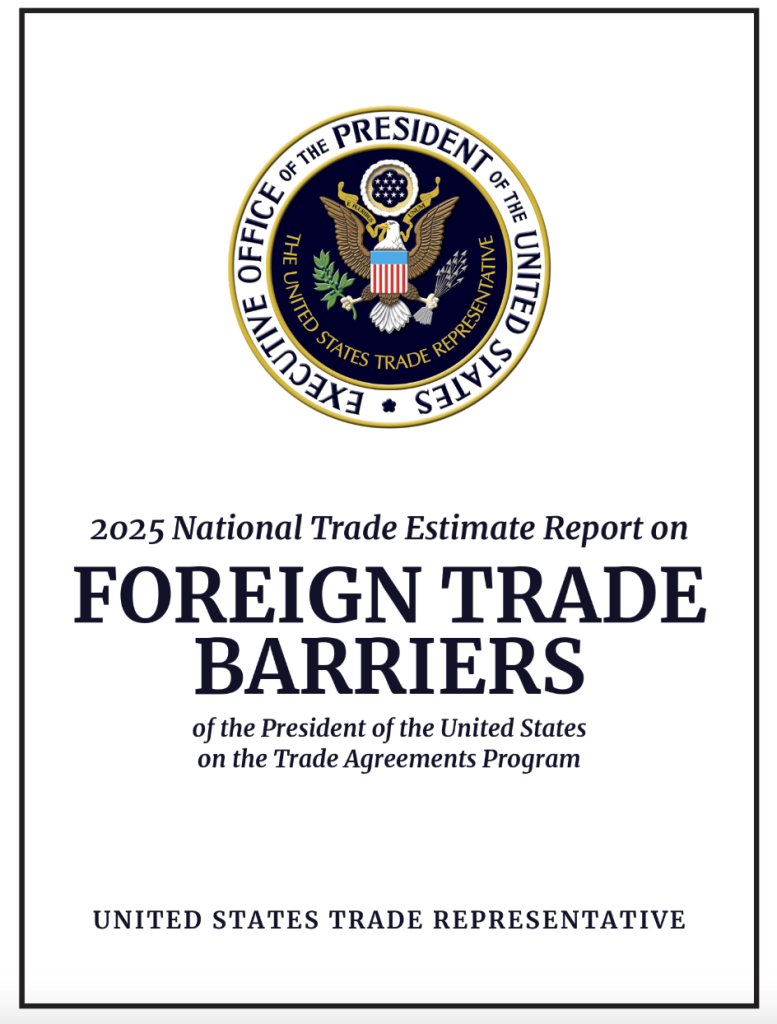
The Trump administration’s US Trade Representative office has released its 2025 National Trade Estimate Report on Foreign Trade Barriers of the President of the United States on the Trade Agreements Program. The document provides a country-by-country analysis of the complaints by business and government officials on actions in each country the United States has trade with. The United States is the Dominican Republic’s leading trading partner.
The areas touched upon are US rice and rebar exports, the import licensing procedure at the Ministry of Agriculture, the Customs Agency handling of US used-vehicle imports, delays in passing a new Procurement Law, among others.
The report looks into actions taken by the Dominican government to protect its rice production. It mentions that as per Tariffs Under the CAFTA–DR, as of 1 January 2015, US non-agricultural goods enter the Dominican Republic duty-free. It reports that on 31 December 2024, Decree-693-24 took effect enabling the DR to retain, in perpetuity, the CAFTA-DR tariffrate quotas (TRQs) from the nineteenth year of the Agreement: a 23,300 metric ton duty-free quota for rice exports from the United States. Any exports beyond that quota would be subject to a 99 percent tariff. US stakeholders have raised concerns that the Dominican Republic may be taking steps that appear to undermine its obligations under the CAFTA-DR. The United States is closely following this issue and engaging bilaterally with the Dominican Republic to address it.
In the section on the Dominican Republic, the report looks into complaints regarding discretionary practices of the Ministry of Agriculture under Minister Limber Cruz regarding the management of import licenses as a means to manage trade in sensitive commodities such as rice, beans, dairy, sugar, poultry, beef, pork, onions and garlic and intermittently with respect to other products. The USTR states that “the need to obtain an import license from the Ministry of Agriculture and the way in which the licensing process is handled can lead to inconsistent application of the law and uneven treatment.”
The report states that importers of US-made used vehicles less than five years old have reported that the Dominican Republic customs authority frequently has challenged the eligibility of those vehicles for preferential tariff treatment under the CAFTA-DR, citing technical difficulties in demonstrating compliance with the rules of origin.
Also questioned are the technical barriers to trade regulation of steel rebar. The USTR report states that multiple US exporters of steel rebar used for construction have complained that a Dominican Republic technical regulation (RTD 458) constitutes a barrier to trade. Dominican Republic authorities have required imported US rebar to be sampled and tested by third-party laboratories, which is not required of domestic production. Because no suitable third-party laboratories exist in the Dominican Republic, samples have been sent back to the United States for testing, resulting in an advantage for domestically manufactured rebar.
The USTR report mentions that “US suppliers have complained that government procurement in the Dominican Republic is not always conducted in a transparent manner and that corruption is a problem.” also addresses the delays in reforming the procurement law to ensure government procurement. A draft government procurement law that would have codified many of the reforms in the new implementing regulation expired in January 2025 after the Chamber of Deputies failed to vote on the bill. The USTR mentions that the Dominican Republic is not a Party to the World Trade Organization (WTO) Agreement on Government Procurement but has been an observer to the WTO Committee on Government Procurement since September 2022. The Dominican Republic has binding international procurement obligations under the CAFTA-DR.
The USTR nevertheless states that in September 2023, while waiting for Congress to consider a draft law on government procurement, the Abinader administration enacted a new Regulation for the Application of Law No. 340-06 on Procurement and Contracting of Goods, Services and Works by Decree 416-23 of the Executive Branch of the Dominican Republic. This regulation replaced the previous Regulation on Procurement and Contracting of Goods, Services, and Works No. 543-12 of 2012. The new implementing regulation addresses transparency and electronic procurement portals, methodology on micro-purchases, streamlining participation for foreign companies, integrity and mitigation risks for vendors, best value for money, transparency of government procurement committees, exception rules, and sustainability in the evaluation criteria.
Read more:
US National Trade Estimate Report
1 April 2025

